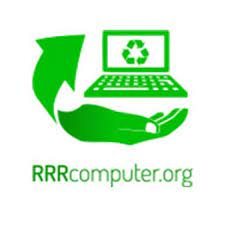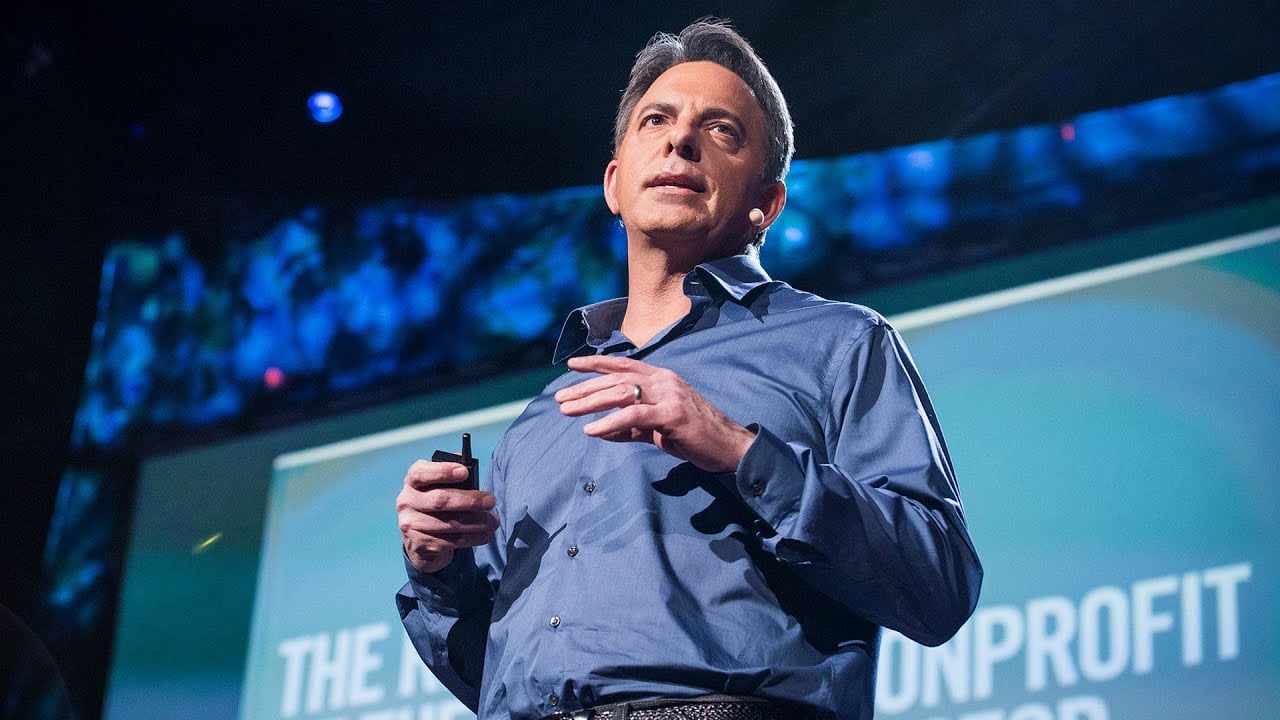10 Best Charities for Tech & Computer Recycling (Complete 2025 List)
Affiliate Disclosure
Hey fellow impactful ninja ?
You may have noticed that Impactful Ninja is all about providing helpful information to make a positive impact on the world and society. And that we love to link back to where we found all the information for each of our posts.
Most of these links are informational-based for you to check out their primary sources with one click.
But some of these links are so-called "affiliate links" to products that we recommend.
Why do we add these product links?
First and foremost, because we believe that they add value to you. For example, when we wrote a post about the environmental impact of long showers, we came across an EPA recommendation to use WaterSense showerheads. So we linked to where you can find them. Or, for many of our posts, we also link to our favorite books on that topic so that you can get a much more holistic overview than one single blog post could provide.
And when there is an affiliate program for these products, we sign up for it. For example, as Amazon Associates, we earn from qualifying purchases.
What do these affiliate links mean for you?
First, and most importantly, we still only recommend products that we believe add value for you.
When you buy something through one of our affiliate links, we may earn a small commission - but at no additional costs to you.
And when you buy something through a link that is not an affiliate link, we won’t receive any commission but we’ll still be happy to have helped you.
What do these affiliate links mean for us?
When we find products that we believe add value to you and the seller has an affiliate program, we sign up for it.
When you buy something through one of our affiliate links, we may earn a small commission (at no extra costs to you).
And at this point in time, all money is reinvested in sharing the most helpful content with you. This includes all operating costs for running this site and the content creation itself.
What does this mean for me personally?
You may have noticed by the way Impactful Ninja is operated that money is not the driving factor behind it. It is a passion project of mine and I love to share helpful information with you to make a positive impact on the world and society. However, it's a project in that I invest a lot of time and also quite some money.
Eventually, my dream is to one day turn this passion project into my full-time job and provide even more helpful information. But that's still a long time to go.
Stay impactful,
Each year, people worldwide discard 20 to 50 million metric tons of e-waste, or around 40 million computers, and only about 12% of them are recycled. At the same time, a quarter of all households in the US lack access to a computer, and half of the schools and organizations worldwide lack the technology to join the digital world. Fortunately, charities are fighting to refurbish or recycle unwanted IT equipment to support disadvantaged communities and protect the environment. So we had to ask: What are the best charities for tech & computer recycling?
The best charities for tech and computer recycling are Sustainable Electronics Recycling International and Computer Aid International. Other charities, like Camara Education and Human-I-T work to reduce e-waste by refurbishing and reusing old computers.
Whether you want to ensure disadvantaged communities get access to technology, protect the environment by reducing your e-waste, or help to create equitable digital opportunities for disadvantaged youth, there is a charity for you. Keep reading to learn more about what the best charities for tech & computer recycling are all about, how they work, and what would be your best way to make a contribution.
Here’s What All the Best Charities for Tech & Computer Recycling Have in Common
The charities on this list were chosen based on their mission, impact, transparency ratings, and achievements.
They operate mainly in the US, the UK, and Africa, fighting to give new usage to old tech equipment.
Most of the charities below work to close the digital divide by refurbishing and reusing unwanted computers or other tech equipment, and donating it to underserved communities worldwide. Furthermore, some charities support developing countries by shipping used computers and building up IT school laboratories. In this way, they give disadvantaged youth access to technology and help increase their digital literacy.
In addition, all charities on the list erase sensitive data from the computers before reusing them. They also physically shred computers and recycle all small components.
Yet, through different means, all the charities share the same goal of reducing e-waste and creating an equitable digital world.
These Are the 10 Best Charities for Tech & Computer Recycling in 2025
Below are our favorite charities for tech & computer recycling (you can click on their link to directly jump to their section in this article):
Best Charities For Tech & Computer Recycling
(At the end of this article we’ll also share our six-step approach on how you can select the best charity to support.)
Sustainable Electronics Recycling International: Solving the World’s Electronics Sustainability Problem

🔎
Their transparency & ratings:
Sustainable Electronics Recycling International has a 4-star rating from Charity Navigator and holds the Bronze Seal of Transparency from GuideStar.
“We are championing electronics sustainability as if the world depends on it… because it does.”
Sustainable Electronics Recycling International
⚒️
What they do:
Sustainable Electronics Recycling International is the housing body and the accredited Standards Development Organization for the R2 Standard; the most widely adopted guideline for recycling used electronics. They create certification programs for tech recycling organizations worldwide, which, if passed, attest they follow best practices when refurbishing e-waste. Furthermore, they run an informational library for businesses to give an in-depth understanding of the tech recycling process and its impact on the environment. In addition, they organize awareness projects to help communities worldwide improve their tech recycling habits.
🚀
What they’ve achieved:
Since their founding, Sustainable Electronics Recycling International has remained committed to reducing the environmental risk of used and end-of-life electronics. For example, from 2015 to 2022, they certified nearly 1,000 recycling organizations with their R2 Standard, across 35 countries and 7 continents. Furthermore, in 2019, they invested $1,75 million across all their certification, recycling, and awareness programs.
✨
Ways to contribute:
You can support Sustainable Electronics Recycling International by starting a corporate partnership to reduce e-waste globally. In addition, you can enroll in one of their R2 Standard Certification programs or follow their LinkedIn profile.
Computer Aid International: Helping People Improve Their Lives Through Technology

🔎
Their transparency & ratings:
According to their financial report, Computer Aid International spent 93% of their total income on charitable activities and 7% on fundraising actions.
“We want to build a world where everyone has equal access to technology through sustainable IT solutions.”
Computer Aid International
⚒️
What they do:
Computer Aid International receives digital devices from donors and refurbishes them to help bridge the digital divide worldwide. For this, they distribute computers to increase the education and economy of underserved communities, helping teachers, farmers, or the unemployed. Furthermore, they use solar power to run computers in areas where the electricity supply is either non-existent or unreliable. They also run projects to set up computer labs in schools and provide teachers with digital literacy training. In addition, they use recycled tech equipment to create Connect Devices that provide access to the internet for schools in regions that lack connectivity.
🚀
What they’ve achieved:
Since their founding, Computer Aid International has brought access to technology to over 14,5 million people and sent refurbished computers to 115 countries worldwide. For example, they have supplied nearly 530,000 computers to institutions in Africa and Latin America. In addition, they have provided over 5,700 computers to 510 organizations in the UK. Furthermore, between 2016 and 2022, they collaborated with 480 companies to refurbish and reuse 52,000 computers while recycling nearly 68,000 pieces of tech equipment. During the same period, they prevented 34 million pounds of CO2 from being released into the atmosphere because of e-waste.
✨
Ways to contribute:
You can donate to Computer Aid International on their website. You can also contribute by making individual or corporate donations of computers. In addition, you can donate small electronics, such as ink cartridges or mobile phones.
Camara Education: Transforming Life Chances in Africa with Technology

🔎
Their transparency & ratings:
According to their financial report, Camara Education spent 91.5% of their total income on charitable activities and 8.5% on fundraising events.
“We exist because we believe the world would be a better place if all young people were empowered through innovative education to create the life they want to lead.”
Camara Education
⚒️
What they do:
Camara Education partners with companies and tech manufacturers worldwide to collect and reuse IT equipment. They securely erase the data from the hard disks and refurbish the computers for charitable use, or shred the components for further recycling. Moreover, they ship computers to African schools, where they install educational software and build Computer Labs to give children access to technology. In addition, they train local educators to teach students digital skills, and work with the schools to maintain the equipment and oversee the learning progress. Furthermore, they ethically recycle shipped computers when they are no longer usable.
🚀
What they’ve achieved:
To date, Camara Education has served over 3,7 million children across 5 African countries – Ethiopia, Kenya, Lesotho, Tanzania, and Zambia. They have also supplied 12,000 schools with nearly 120,000 computers and provided digital training to over 60,000 school teachers. For example, in 2017, they invested over $3,6 million across their educational and refurbishing projects while giving access to technology to 430,000 African learners. In the same year, they worked with almost 1,600 African schools to provide 14,000 computers and support over 7,000 educators with digital skills lessons.
✨
Ways to contribute:
You can donate to Camara Education on their website. You can also support them by donating computers or starting corporate partnerships. In addition, you can make corporate donations to help them build schools across Africa.
Human-I-T: Empower People. Protect the Earth.

🔎
Their transparency & ratings:
Charity Navigator gives Human-I-T a 68% score for the accountability & finance metric, and a 100% score for both the Culture and Leadership metrics. The charity also holds the Platinum Seal of Transparency from GuideStar.
“By donating e-waste, we empower people with the digital tools, resources, and support they need to unlock their full potential.”
Human-I-T
⚒️
What they do:
Human-I-T collects unwanted technology from companies and refurbishes it by erasing all stored data and following international destruction protocols. If they cannot erase all sensitive data, they physically crush and recycle all remaining components. If they can wipe off the data, they donate the computers to underserved communities, such as low-income families, people with disabilities, or veterans in need, to close the digital divide nationwide. Furthermore, they help the recipients with computer and internet training, as well as tech support, as they learn to use their new devices.
🚀
What they’ve achieved:
To date, Human-I-T has prevented 12 million pounds of e-waste from going to landfills and distributed 280,000 tech devices across Los Angeles and Detroit. Moreover, they assisted 107,000 recipients with internet installation services and helped nearly 30,000 new digital users with critical tech support. For example, in 2021, they put 60,200 electronics back into the circular economy and distributed more than 13,500 computers to low-income individuals.
✨
Ways to contribute:
You can donate to Human-I-T on their website. You can also contribute by donating your unwanted technology, as an individual or a company. In addition, you can volunteer or start a corporate sponsorship.
Comprenew: We Make It Easy to Do the Right Thing

🔎
Their transparency & ratings:
Comprenew has a 65% encompass score for Finance & Accountability from Charity Navigator. They also hold the Gold Seal of Transparency from GuideStar.
“We strive to protect businesses, people and the environment from the threat of improperly disposed electronic devices.”
Comprenew
⚒️
What they do:
Comprenew runs nationwide pick-ups of donated computers which are then recycled or reused. They recycle the electronics by destroying all stored data through their DataRIP™ Security Services Program, then shredding the hardware components for further use. They also supply computers to organizations that provide assistance and training to at-risk populations, like community centers or orphanages. In addition, they work with schools and other institutions to provide computers to low-income families and advance children’s education. They also hire people from vulnerable communities to aid the recycling process.
🚀
What they’ve achieved:
To date, Comprenew has achieved 7 distinct certifications of proper electronic recycling standards. Furthermore, in 2014, they recycled over 4,5 million pounds worth of surplus electronics and provided nearly 40,000 hours of tech recycling education classes. Moreover, in 2018, they saved 850,000 electronics from harmful disposal and helped reuse 38,500 hard drivers by completely erasing all stored data. In the same year, they provided recycling and IT training to nearly 20,000 underserved people and improved digital literacy for 2,000 community members.
✨
Ways to contribute:
You can donate to Comprenew on their website. You can also support the charity by donating personal computers. In addition, you can buy their refurbished electronics or use their computer repair services.
IT Schools Africa: Transforming Lives Through Access to e-Learning

🔎
Their transparency & ratings:
According to their financial report, IT Schools Africa spent 96.6% of their total income on charitable activities and 3.4% on fundraising campaigns.
“We aim to alleviate poverty and create thriving communities through access to technological devices and knowledge.”
IT Schools Africa
⚒️
What they do:
IT Schools Africa collects donated computers and IT equipment, then refurbishes them. They also hire unemployed, poor, or disabled workers to help develop their job prospects by improving their IT and communication skills. In addition, the charity collaborates with UK prisons to teach inmates to disassemble equipment for refurbishment. Furthermore, the organization ships used laptops to African schools to give students access to digital education and improve their employment chances. Moreover, they properly recycle all end-of-life tech equipment when it is no longer usable.
🚀
What they’ve achieved:
Since their founding, IT Schools Africa has given access to technology to nearly 5,4 million African youth. They did this by shipping more than 65,000 computers and establishing almost 2,500 computer facilities in local schools. For example, in 2021 alone, they shipped over 3,500 laptops and helped nearly 320,000 African students to access e-learning. In the same year, they saved an additional 6,630 computers from being wasted by donating 151 of them to local charities and recycling all others. They also helped 25 UK volunteers to improve their IT and refurbishing skills.
✨
Ways to contribute:
You can donate to IT Schools Africa on their website. You can also support them by donating your IT equipment, volunteering, or fundraising.
Turing Trust: Technology-Enabled Education

🔎
Their transparency & ratings:
According to their financial report, the Turing Trust spent 52% of their total income on computer refurbishment activities, 20.4% on their technological projects in Malawi, and 27% on administrative and overhead costs.
“Our vision is a world with technology-enabled education for all. We aim to empower disadvantaged communities using information technology-enabled learning.”
The Turing Trust
⚒️
What they do:
The Turing Trust works to give access to technology to African youth. For this, they use donated tech equipment to create IT labs in schools and load refurbished computers with educational software. They also monitor and support schools to ensure the equipment is functioning and recycle all computers after they become unusable. In addition, they provide digital training and computer literacy lessons to African teachers and their students. Furthermore, they design SolarBerry-s – computer labs from upcycled shipping containers and powered by solar panels – to reach African communities that lack access to electricity.
🚀
What they’ve achieved:
Since their inception, the Turing Trust has donated 12,600 computers to 300 schools in 8 African countries, reducing worldwide carbon emissions by 3,500 tons. In addition, they have installed 162 computer labs where they gave digital literacy training to 1,000 teachers and helped 116,000 students develop IT skills. For example, in 2017, they offered Liberian schools over 500 PCs and monitors, along with 1,500 IT accessories, like power cables and keyboards. Furthermore, in 2021 alone, they sent 3,500 PCs to 70 African schools and organizations, thus saving nearly 1,000 tons of carbon emissions.
✨
Ways to contribute:
You can donate to the Turing Trust on their website. You can also contribute by making individual or corporate computer donations. In addition, you can volunteer or listen to their monthly podcast.
InterConnection: Charitable Computer Recycling & Reuse

🔎
Their transparency & ratings:
Charity Navigator gives InterConnection a 71% score for the Accountability & Finance metric, and a 100% score for Culture & Community. They also hold the Gold Seal of Transparency from GuideStar.
“Our mission is to make information and communication technology accessible to underserved communities around the world.”
InterConnection
⚒️
What they do:
InterConnection gathers used electronics from donors and refurbishes them for recycling or charitable reuse. They do this by destroying all confidential data and shredding hard drives or other components. They also give functional computers at a deep discount to low-income individuals and families to help them gain access to technology. Moreover, they help communities affected by natural disasters to repair their IT infrastructure by using donated tech equipment. In addition, they donate computers to other charities while organizing computer giveaways for companies and individuals.
🚀
What they’ve achieved:
Since their founding, InterConnection has helped over 300,000 people in 40 different countries to connect to critically needed technology. For example, they have distributed over 1,000 computers to rural schools in Chile, Haiti, and Pakistan, following natural disasters. In addition, their retail stores in Seattle and Kenmore provide over 400 low-income families, individuals, and students with affordable laptops each month.
✨
Ways to contribute:
You can donate to InterConnection on their website. You can also contribute by donating your e-waste or joining their newsletter.
Compudopt: Equip. Connect. Inspire.

🔎
Their transparency & ratings:
Compudopt holds the Platinum Seal of Transparency from GuideStar.
“We offer the critical technology needed to equip students with the skills needed for jobs today and tomorrow.”
Compudopt
⚒️
What they do:
Compudopt works to close the digital divide by collecting donated computers and other tech equipment to provide technology access to disadvantaged communities. They do this by organizing local computer giveaways for people in need across the US. To qualify, the families must lack access to a working computer at home and have a child in pre-K-12 education. The charity also works with local partners to properly refurbish the equipment to make it fully functional and to erase the sensitive information of previous owners.
🚀
What they’ve achieved:
Since their founding, Compudopt has distributed over 60,000 computers that helped recycle over 530 tons of e-waste. They have also organized computer giveaways in 23 cities and 15 states, which impacted nearly 200,000 families and improved the education of 71,000 school students. In addition, they have connected more than 500 households to an internet provider and supported teenagers nationwide through 225,000 tech training hours.
✨
Ways to contribute:
You can donate to Compudopt on their website. You can also contribute by donating your unwanted computers, volunteering, or by starting a Facebook fundraiser.
RRRcomputer: A World Where All Children Are Prepared for the Digital Future

🔎
Their transparency & ratings:
RRRcomputer holds the Gold Seal of Transparency from GuideStar.
“We divert computing devices that would otherwise be thrown away and transform e-waste into life-changing opportunities for youth.”
RRRcomputer
⚒️
What they do:
RRRcomputer gathers laptops or other digital devices from donors and refurbishes them with strict data security standards. Afterward, they donate the computers to low-income K-12 youth to improve their educational opportunities and close the digital divide nationwide. They also promote digital inclusion by shipping digital equipment to after-school institutions and by organizing online tech development classes for underserved teens. In addition, they provide community classes on digital skills like basic coding, online safety, or hardware troubleshooting.
🚀
What they’ve achieved:
Since their inception, RRRcomputer has impacted 2,085 students by distributing 417 computers and accessories to disadvantaged youth in the San Francisco Bay Area. In addition, they have provided 55 coding hours to low-income schools and after-school programs. Furthermore, they invested over $350,000 into students’ digital education through all their services and device donations.
✨
Ways to contribute:
You can donate to RRRcomputer on their website. You can also support them by donating personal laptops, volunteering, or by starting a corporate sponsorship.
How Can You Select the Best Charities to Support?
The charities on the list are, we deem, the best charities for tech & computer recycling. However, you may have a particular charity you want to support. Let’s look at what you can do to ensure your contribution has the most significant impact.
- Check out the charity website. Charities that are worthy of your donations are transparent in their mission and their figures. Familiarise yourself with their history, mission, and values. Their website usually is the best place to start.
- Identify the charity’s mission. Without a goal, the charity is likely to fail. If the charity’s mission isn’t clear, it’s probably worth looking for a charity that does have a clear mission.
- Check if the charity has measurable goals. An effective charity has clear goals. You want to know your donation will help the charity reach its goals. But if it doesn’t have targets, it’s likely to fail or squander your gift. The charity should be able to account for its spending and supply evidence of the work they do.
- Assess the successes or goals the charity has achieved. You wouldn’t invest in a business if it kept missing its targets. In the same way, charities are like this too. If no one is assessing a charity’s progress in reaching its targets, the chances are they’re not making a substantial positive change.
- Check the charity’s financials and stats. Trustworthy organizations will publish financial statements and reports each year. Some might be exempt from having to do so, but they should be able to provide them to public members who are interested in donating.
- Locate sources who work with or benefit from the charity. Word of mouth and first-hand experience of a charity’s work lets you know the charity’s quality. If you’re able to do so, check out the charity for yourself or speak to someone familiar with it. This way, your donation will go to the right place.
How Can You Best Support These Charities?
After you’ve made your decision, it’s time for you to decide on how you’d like to help the charities you’ve chosen. Check how you can help – each charity runs specific programs that have unique aims. Find out what the aim of such programs is and whether they are right for you.
Here are a few ways you can help your chosen charity:
- Donate money. You can find donation pages on the website of most charities. Your donation can be a one-time payment, or you can set it to be deducted regularly at different intervals. You can mostly pay via credit card, but some charities also take PayPal or Bitcoin payments.
- Buy their official merchandise. The charities can also raise money by selling merchandise. So, you can support them by buying the mugs, shirts, caps, pens, pencils, and any other such items they may be selling. Ideally, you should buy as much as you can to share and spread the word about the charity’s activities.
- Engage in volunteer work. As you’ve seen from our descriptions above, some charities engage in a lot of local and grassroots programs. You can help by taking on and organizing the program in your local area.
- Help their fundraising efforts. You can spread the word about the charity in your workplace, school, church, etc., and hold creative fundraising drives on social media or offline within your small circles.
- Share their stories. Most charities have compelling stories that you can share with your audience to attract more people to the cause.
Final Thoughts
Now it is up to you to select the charity that resonates most with you. And whichever charity you end up choosing and contributing to, we are sure that they will immensely appreciate your support. Hopefully, the information within this article has made this selection process a bit easier for you to support charities dedicated to tech & computer recycling – based on the causes that matter most to you.
Stay impactful,

PS: Finally, I want to leave you with a thought-provoking TED talk from Dan Pallotta, a leading philanthropic activist and fundraiser, about what is wrong with the way we think about charities – and what we can do about it:
Sources
- United Nations: Waste Management 2015
- The World Counts: Electronic Waste Facts
- YouTube: Electronics reuse and recycling for good
- Sustainable Electronics Recycling International: home
- Sustainable Electronics Recycling International: about our story and mission
- Charity Navigator: Sustainable Electronics Recycling International
- GuideStar: Sustainable Electronics Recycling International
- Sustainable Electronics Recycling International: a call to action
- Sustainable Electronics Recycling International: R2
- Sustainable Electronics Recycling International: key steps in the certification process
- Sustainable Electronics Recycling International: best practices
- Sustainable Electronics Recycling International: understanding the real impact of your decisions
- Sustainable Electronics Recycling International: sustainable ITAD
- Sustainable Electronics Recycling International: knowledge sharing
- Sustainable Electronics Recycling International: find an R2-certified facility
- Sustainable Electronics Recycling International: join the mission
- Sustainable Electronics Recycling International: R2 Certification Bodies
- LinkedIn: Sustainable Electronics Recycling International
- Computer Aid International: home page
- Computer Aid International: impact report 2020
- Computer Aid International: IT disposal
- Computer Aid International: work and projects
- Computer Aid International: what we do
- Computer Aid International: our solar learning labs
- Computer Aid International: projects
- Computer Aid International: our digital schools
- Computer Aid International: our methods and strategies
- Computer Aid International: our connect device
- Computer Aid International: Our Impact
- Computer Aid International: donate
- Computer Aid International: individual computer donation
- Computer Aid International: corporate computer donation
- Computer Aid International: Ink cartridge recycling
- Camara Education: home page
- Camara Education: financial statement
- Camara Education: IT asset disposition
- Camara Education: secure GDPR
- Camara Education: about us
- Camara Education: recycling process
- Camara Education: Camara in Africa
- Camara Education: sustainability
- Camara Education: our achievements
- Camara Education: Ethiopia
- Camara Education: Kenya
- Camara Education: Lesotho
- Camara Education: Tanzania
- Camara Education: Zambia
- Camara Education: 2017 annual report
- Camara Education: donate
- Camara Education: donate computers
- Camara Education: corporate sponsorships
- Camara Education: sponsor a school
- Human-I-T: home page
- Charity Navigator: Human-I-T
- GuideStar: Human-I-T
- Human-I-T: accepted items
- Human-I-T: professional e-waste services
- Human-I-T: data destruction
- Human-I-T: low-cost devices
- Human-I-T: digital training
- Human-I-T: tech support overview
- Human-I-T: our impact
- Human-I-T: 2021 annual report
- Human-I-T: donate
- Human-I-T: individual computer donations
- Human-I-T: corporate donations
- Human-I-T: volunteering
- Human-I-T: corporate sponsorships
- Comprenew: home page
- Comprenew: about
- Charity Navigator: Comprenew
- GuideStar: Comprenew
- Comprenew: corporate services
- Comprenew: recycling
- Comprenew: asset recovery
- Comprenew: ITAD services
- Comprenew: mobile harddrive shredding
- Comprenew: social impact
- Comprenew: certifications
- Comprenew: 2014 annual report
- Comprenew: 2018 annual report
- Comprenew: donate
- Comprenew: donate personal computers
- Comprenew: shop refurbished computers
- Comprenew: computer repair
- Comprenew: careers
- Comprenew: newsletter sign up
- IT Schools Africa: home page
- IT Schools Africa: financial report
- IT Schools Africa: in the UK
- IT Schools Africa: in Africa
- IT Schools Africa: the environment
- IT Schools Africa: 2020 annual report
- IT Schools Africa: donate
- IT Schools Africa: donate IT equipment
- IT Schools Africa: volunteer
- IT Schools Africa: fundraise
- The Turing Trust: home page
- The Turing Trust: 2021 annual report
- The Turing Trust: rest of Africa
- The Turing Trust: Malawi
- The Turing Trust: Liberia Care International
- The Turing Trust: SolarBerry
- The Turing Trust: donate
- The Turing Trust: individual computer donation
- The Turing Trust: business computer donation
- The Turing Trust: volunteer
- The Turing Trust: the Alan Turing Podcast
- InterConnection: home page
- Charity Navigator: InterConnection
- GuideStar: InterConnection
- InterConnection: accepted items
- InterConnection: donating personal computers
- InterConnection: data destruction
- InterConnection: Impact
- InterConnection: Avanade Tech Grant
- InterConnection: Local impact
- InterConnection: donate
- InterConnection: give e-waste
- InterConnection: subscribe to newsletter
- Compudopt: home page
- GuideStar: Compudopt
- Compudopt: computer donations FAQ
- Compudopt: donate computers
- Compudopt: computer giveaways
- Compudopt: annual report
- Compudopt: donate
- Compudopt: give unwanted technology
- Compudopt: volunteer
- Compudopt: Facebook fundraisers
- RRRcomputer: home page
- GuideStar: RRRcomputer
- RRRcomputer: our mission
- RRRcomputer: apply
- RRRcomputer: technical development series
- RRRcomputer: our impact
- RRRcomputer: donate
- RRRcomputer: give personal laptops
- RRRcomputer: volunteer


















